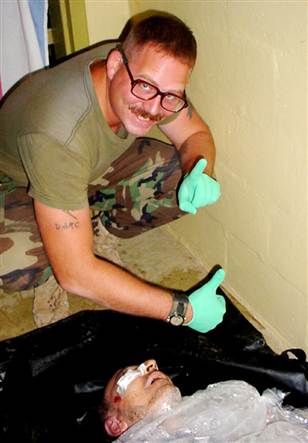There is no genuine or legal justification for still using strip
searches in prisons today, except to breed homosexuality and cause
aggressive sexual assaults, using it as a punishment to humiliate
someone. I can prove without a doubt that times have changed/evolved and
this strip naked prison rule is outdated. Modernized technology has
invented what is called x-ray machines, which are used to search/see the
body without forcing nude search. Prisoncrats provided prisons with
sufficient funds to purchase and provide such x-ray machines. Prison
staff, in their sadistic practices and policies to punish captives,
refuse to use the x-ray machines for body searches.
Metal detectors are stationed throughout the prison, checkpoints forcing
captives to walk through them, in their policy to confiscate any and all
illegal metal objects. Captives are never asked if they are allergic to
the radiation of the metal detectors or x-ray machines, which explains
the prison staff’s complete disregard for the physical or psychological
effects on the captives.
We captives of the Pennsylvania state prisons ask for legal advice in
our desires to sue the Department of Corrections for forcing the strip
search policies. We live during advanced technologies and modernized
minds, which dictates, strip searches are outdated, violates religious
rights, breeds sexual predators, and are methods used to harass,
humiliate and harm captives. Not to mention strip searchings are methods
used identical to the times of slavery.
If for no other humane reasons, prison strip searches needs to be
abolished, eliminated, minimized, because state prisons have been
provided with the necessary machinery and manpower to secure prison
grounds and facilities. The time is here. We the state captives in
Pennsylvania prisons ask any and all judicial scholars and students of
civil law, for legal advice, and to petition the courts to abolish all
prison strip search policies.
There is the questions raised about prison security being vulnerable,
and breached, if the strip search policy is eliminated. Such positions,
beliefs or arguments are simply said to continue this long practice of
psychological slavery in prisons. When in fact, x-ray machines detect
any metal or foreign objects and contraband. Therefore, since state
prisons have x-ray machines and metal detectors on facility grounds, it
shows any need to search a subject can be done without the need of such
said subjects being forced to disrobe, strip naked. Which means, if the
metal detectors and x-ray machines they have are not successful to
secure the prison facilities, then their machines are obsolete and
obtained falsely.
However, if such machines and technologies are vital and essential to
the security orders of running the prisons, then strip searchings are
deemed obsolete and performed falsely. It is our contention, challenge,
calling, that because x-ray and metal detector machines are used, that
shows strip searches are no longer needed or necessary. Which proves
strip searching are being used simply as a form of the prison’s
psychological punishments.
The Pennsylvania Department of Corrections state prisons has implemented
a new policy against sexual assaults/harassments, called the Prison Rape
Elimination Act (PREA). This PREA policy exposes its own ineffectiveness
and prejudicial punishment, under the disguise of prosecuting sexual
harassment and/or predators. To prove that this new PREA policy has been
designed to minimize and eliminate sexual assaults in all of its
manifestations on prison grounds, strip searching would also be
minimized or eliminated as a means to sexual assaults and sexual
harassments on state prison grounds.
MIM(Prisons) responds: This writer makes an important point:
guards use strip searches as a form of gendered power that humiliates
and degrades prisoners. But we don’t agree that this abuse of power
causes guards (or prisoners) to become homosexual. And even if that was
possible, it’s patriarchal society that teaches people to use gender for
power and abuse which is the problem. There is no evidence that any
sexual orientation is more predatory than any other. We need to focus on
the real enemy here: the patriarchy which trains people to enjoy the
abuse of gender power.
Prisoners are in a unique position in that they face gender oppression
as a part of their imprisonment. This is true of both male and female
prisoners. Strip searches are a good example of this gender oppression.
This writer raises a good point about the abuse of power, and
specifically gender power, that happens every time there is a strip
search. This degrading practice is not for security, as this writer
clearly demonstrates.
Identifying this form of oppression and calling it out for people to see
is the first step in fighting back. The idea of using PREA to fight
strip searches is an interesting approach. We’d like to hear from others
who are fighting strip searches about what tactics are and are not
working. Ultimately gender oppression in prisons isn’t going away while
we have a criminal injustice system serving imperialism. The patriarchy
is an integral part of this system. But we can sometimes win smaller
battles against these forms of humiliation and degradation.






 Alabama
Alabama
 Alaska
Alaska
 Arizona
Arizona
 Arkansas
Arkansas
 Army Post
Army Post
 California
California
 Colorado
Colorado
 Connecticut
Connecticut
 Delaware
Delaware
 District of Columbia
District of Columbia
 Federal
Federal
 Florida
Florida
 Georgia
Georgia
 Guam
Guam
 Hawaii
Hawaii
 Idaho
Idaho
 Illinois
Illinois
 Indiana
Indiana
 Iowa
Iowa
 Kansas
Kansas
 Kentucky
Kentucky
 Louisiana
Louisiana
 Maine
Maine
 Maryland
Maryland
 Massachusetts
Massachusetts
 Michigan
Michigan
 Minnesota
Minnesota
 Mississippi
Mississippi
 Missouri
Missouri
 Montana
Montana
 Nebraska
Nebraska
 Nevada
Nevada
 New Hampshire
New Hampshire
 New Jersey
New Jersey
 New Mexico
New Mexico
 New York
New York
 North Carolina
North Carolina
 North Dakota
North Dakota
 Ohio
Ohio
 Oklahoma
Oklahoma
 Oregon
Oregon
 Pennsylvania
Pennsylvania
 Puerto Rico
Puerto Rico
 Rhode Island
Rhode Island
 South Carolina
South Carolina
 South Dakota
South Dakota
 Tennessee
Tennessee
 Texas
Texas
 Utah
Utah
 Vermont
Vermont
 Virginia
Virginia
 Washington
Washington
 West Virginia
West Virginia
 Wisconsin
Wisconsin
 Wyoming
Wyoming

